Informative Essay — Purpose, Structure, and Examples


What is informative writing?
Informative writing educates the reader about a certain topic. An informative essay may explain new information, describe a process, or clarify a concept. The provided information is objective, meaning the writing focuses on presentation of fact and should not contain personal opinion or bias.
Informative writing includes description, process, cause and effect, comparison, and problems and possible solutions:
Describes a person, place, thing, or event using descriptive language that appeals to readers’ senses
Explains the process to do something or how something was created
Discusses the relationship between two things, determining how one ( cause ) leads to the other ( effect ); the effect needs to be based on fact and not an assumption
Identifies the similarities and differences between two things; does not indicate that one is better than the other
Details a problem and presents various possible solutions ; the writer does not suggest one solution is more effective than the others

Purpose of informative writing
The purpose of an informative essay depends upon the writer’s motivation, but may be to share new information, describe a process, clarify a concept, explain why or how, or detail a topic’s intricacies.
Informative essays may introduce readers to new information .
Summarizing a scientific/technological study
Outlining the various aspects of a religion
Providing information on a historical period
Describe a process or give step-by-step details of a procedure.
How to write an informational essay
How to construct an argument
How to apply for a job
Clarify a concept and offer details about complex ideas.

Explain why or how something works the way that it does.
Describe how the stock market impacts the economy
Illustrate why there are high and low tides
Detail how the heart functions
Offer information on the smaller aspects or intricacies of a larger topic.
Identify the importance of the individual bones in the body
Outlining the Dust Bowl in the context of the Great Depression
Explaining how bees impact the environment
How to write an informative essay
Regardless of the type of information, the informative essay structure typically consists of an introduction, body, and conclusion.
Introduction
Background information
Explanation of evidence
Restated thesis
Review of main ideas
Closing statement

Informative essay introduction
When composing the introductory paragraph(s) of an informative paper, include a hook, introduce the topic, provide background information, and develop a good thesis statement.
If the hook or introduction creates interest in the first paragraph, it will draw the readers’ attention and make them more receptive to the essay writer's ideas. Some of the most common techniques to accomplish this include the following:
Emphasize the topic’s importance by explaining the current interest in the topic or by indicating that the subject is influential.
Use pertinent statistics to give the paper an air of authority.
A surprising statement can be shocking; sometimes it is disgusting; sometimes it is joyful; sometimes it is surprising because of who said it.
An interesting incident or anecdote can act as a teaser to lure the reader into the remainder of the essay. Be sure that the device is appropriate for the informative essay topic and focus on what is to follow.

Directly introduce the topic of the essay.
Provide the reader with the background information necessary to understand the topic. Don’t repeat this information in the body of the essay; it should help the reader understand what follows.
Identify the overall purpose of the essay with the thesis (purpose statement). Writers can also include their support directly in the thesis, which outlines the structure of the essay for the reader.
Informative essay body paragraphs
Each body paragraph should contain a topic sentence, evidence, explanation of evidence, and a transition sentence.

A good topic sentence should identify what information the reader should expect in the paragraph and how it connects to the main purpose identified in the thesis.
Provide evidence that details the main point of the paragraph. This includes paraphrasing, summarizing, and directly quoting facts, statistics, and statements.
Explain how the evidence connects to the main purpose of the essay.
Place transitions at the end of each body paragraph, except the last. There is no need to transition from the last support to the conclusion. A transition should accomplish three goals:
Tell the reader where you were (current support)
Tell the reader where you are going (next support)
Relate the paper’s purpose
Informative essay conclusion
Incorporate a rephrased thesis, summary, and closing statement into the conclusion of an informative essay.
Rephrase the purpose of the essay. Do not just repeat the purpose statement from the thesis.
Summarize the main idea found in each body paragraph by rephrasing each topic sentence.
End with a clincher or closing statement that helps readers answer the question “so what?” What should the reader take away from the information provided in the essay? Why should they care about the topic?
Informative essay example
The following example illustrates a good informative essay format:

- Essay Guides
- Main Academic Essays
- How to Write an Informative Essay: Definition, Structure, Steps & Examples
- Speech Topics
- Basics of Essay Writing
- Essay Topics
- Other Essays
- Research Paper Topics
- Basics of Research Paper Writing
- Miscellaneous
- Chicago/ Turabian
- Data & Statistics
- Methodology
- Admission Writing Tips
- Admission Advice
- Other Guides
- Student Life
- Studying Tips
- Understanding Plagiarism
- Academic Writing Tips
- Basics of Dissertation & Thesis Writing
- Research Paper Guides
- Formatting Guides
- Basics of Research Process
- Admission Guides
- Dissertation & Thesis Guides
How to Write an Informative Essay: Definition, Structure, Steps & Examples

Table of contents
Use our free Readability checker

You may also like

An informative essay is a piece of academic writing that provides clear and balanced information about a specific topic. Its main objective is to educate and inform the reader about a subject, rather than to persuade or argue a point of view.
In this article, we will talk about how to write an informative essay and structure it in an organized way. From introduction to conclusion, we will walk you through each step of informational essay format writing. Keep reading and you will find valuable tips from professional essay writing services and informative essay examples along the way.
But before we dig deeper into details, let’s define what an informative essay is.
Our professional team of experienced writers is here to assist you with your essays, ensuring high-quality and timely submissions. Take the stress out of essay writing and get straight As effort-free. Order essays online now for personalized assistance!
FAQ About Informative Essays
1. what is the main purpose in writing an informative essay.
The main purpose of writing an informative essay is to educate and provide information. Writer's task is to present facts, details, and explanations about a subject without convincing the audience.
2. How to start an informative essay?
To start an informative essay, you can begin with an attention-grabbing introduction that creates context and engages the reader's interest. You can use a relevant anecdote or a shocking fact to make your opening section intriguing. Then, introduce your topic and provide a brief thesis statement communicating your main focus.
3. How many paragraphs are there in an informative essay?
The number of paragraphs in an informative essay can vary depending on the essay length and its complexity. However, a typical informative essay includes 5 paragraphs. You can always adjust the number of sections based on how much you want to tell.
Daniel Howard is an Essay Writing guru. He helps students create essays that will strike a chord with the readers.
An informative essay, as the name suggests, is a type of essay intended to enlighten the reader about a particular subject. The primary purpose of an informative essay is to present information in a clear, concise, and well-structured manner. In this type of writing, students shouldn’t express personal opinions or attempt to persuade their audience.
While informative essays and other academic writing styles may share some structural similarities (e.g., introduction, body, and conclusion), their goals and approaches are distinct.
Unlike other popular forms of academic writing, such as argumentative or persuasive essays , informative essays focus solely on presenting factual information. They do not seek to persuade readers to adopt a particular viewpoint, nor do they provide an analysis, like analytical essays do.
Many students also confuse it with an expository essay . However, unlike expository writing, informational essays do not explore a topic so extensively. Instead, they just offer relevant information.
Informative essay writing deals largely with suggesting well-researched information to expand someone’s knowledge. Teachers assign it to test how well students can educate on a chosen matter without leaving personal biases or emotional appeals. In this sense, an informative essay is more of an educational than a persuasive tool.
Informative essays have a few peculiar features that set them apart from other forms of writing. Here are the main ones:
Now that you are familiar with the fundamentals, let’s look at how to structure an essay .
To write informatively, you need to sort things out in a logical order. The structure of an informative essay is typical and comprises 5 paragraphs: an introduction, 3 body paragraphs, and a conclusion. Sometimes, you will need to compose more paragraphs if you feel that information you have provided is insufficient.
Let’s take a closer look at each part individually.
An informative essay introduction paragraph is a perfect place to capture your reader's attention. It should include such components:
Your opening will start with a compelling "hook" – a staggering statistic, an interesting anecdote, or a provocative question. This is followed by a brief transition to the topic, which provides some context. You may include essential facts, historical background, or why the theme is important. Remember to keep it concise and don’t overdo with details.
Your introductory paragraph should end with a thesis statement. And we will talk about it right below.
>> Read more: How to Write a Hook for an Essay
Your thesis statement is arguably the most crucial sentence in your paper. It establishes your ruther direction by framing the main points you will cover. Thesis for an informative essay should be neutral and objective. Here, you should focus on presenting facts rather than asserting an opinion. A thesis statement is brief and usually takes no more than 1-2 sentences.
The body part is where you delve into the details of your topic. Here are the things you should cover in each section:
Each paragraph begins with a topic sentence, which introduces the main point of that section. But this shouldn’t be a bold statement. Integrate supporting details, which may include facts, statistics, examples, or explanations that elaborate on the topic sentence. Use transition words for essay to build links between your sentences.
Every paragraph should stick to one main idea and shouldn't change the subject. Additionally, your body part should systematically address the key point mentioned in your thesis statement. For instance, if you are talking solely about the origin of art, you can’t suddenly change the direction and discuss its use in modern society.
>> Learn more: How to Write a Body Paragraph
The conclusion of an informative essay serves to bring about the key points presented in your paper. This is the last paragraph and it should bring a sense of closure. Keep in mind this structure:
While an informative essay doesn't typically require a call-to-action, you might end with a thought-provoking question or a relevant implication for further consideration.
At this point, you should be equipped with all necessary knowledge, and we finally can discuss how to write an informative essay. This guide will walk you through each phase of your essay writing process .
In the steps below, you'll learn how to select a captivating topic, retrieve necessary information and weave those facts into your paper. From penning a powerful thesis statement to rounding it all off with a succinct conclusion, we will cover each essential stage. Without further ado, let’s see how to write an informational essay together!
Choosing a topic is a critical first step in writing an informative essay.
Before you pick any title, ensure you understand your assignment and its requirements thoroughly. Only when all instructions are clear, start brainstorming all potential informative essay topics . Remember to include subjects that pique your interest, as writing about something you love can make the process enjoyable.
Once you've got your list, it's time to narrow it down. Select topics that are relevant to your audience and have ample information available for research. Also, consider the scope – it shouldn't be too broad or too narrow. After all, you don’t want to end up writing about a subject that has limited information.
After evaluating based on all criteria described above, select the idea that ticks all the boxes.
The integral part of academic essay writing is a thorough investigation. When you're ready to start gathering facts for your informative essay, the first thing to remember is to truly understand the concept. Look it up online and read a few general articles to get a handle on the subject.
When it comes to research sources, variety is your friend. Try to explore a mix of resources like books, academic articles, reliable websites, and documentaries. It is better to exclude sources that provide an opinion on the matter (for example, article review , book review or critical analysis ). Pay attention to the date of publishing and avoid outdated sources older than 5 years.
While researching, be critical. Not all information you'll find, especially on the internet, is accurate or reliable. Check the author's credentials and the source's reputation. Always aim for information from authoritative and trustworthy sources.
As you carry out your research, remember to take notes. There are 2 things you should keep in mind at this stage:
Now let’s figure out how to write a thesis statement for an informative essay.
Writing a thesis statement for an informative essay is like drawing a map for your reader. Usually, it’s a 1-2 sentences statement that highlights the major focus of your paper. This is your opportunity to tell your audience exactly what information you will be presenting.
Avoid being vague or overly general. For instance, if your essay is about the impacts of climate change on agriculture, your thesis statement could be:
As you can see, this statement is informative, but neutral. In this case, a college essay writer isn’t trying to take any particular stance on climate change. Instead, they are just saying that climate change affects agriculture. Let’s consider another example of a thesis statement for informative essay on the history of the Internet:
By having a clear plan of action, you will be able to write an informative essay without taking unexpected turns. Much like a compass, an outline serves as a vital tool during the writing process helping students to stay on track.
In most cases, instructions may not explicitly require the preparation of an outline. However, we still suggest that you create a basic plan listing the main ideas of each section. By having a layout, students can easily refer to it whenever they veer off topic. This ensures that your thoughts remain aligned with the central theme of your writing.
Writing an informative essay is all about breaking down complex information into digestible chunks of information. There are 2 ways to go about creating an informative essay:
You may think that skipping the draft will save you time, and opt for the first way. We highly recommend preparing a draft instead. This way, you'll see your thoughts on paper and be able to rearrange them if needed. Ultimately, it takes less time and allows you to craft a well-organized paper.
Your draft shouldn’t be perfect. It's a starting point that you'll polish later. At this stage, just focus on transforming your ideas and research into a structured form. You can try essay typer free right now instead of doing the task yourself.
Next, let’s explore how to start an informative essay in an engaging manner. Our professionals shared some valuable tips on composing a truly effective opening paragraph.
Your task in the introduction for informative essay is to get your readers interested and present them with a preview of what's to come.
To begin, create a hook. This could be a striking fact or an intriguing question. Another nice option is adding a simile or metaphor. The purpose of the hook is to entice your readers right from the beginning. For instance, if you're writing about recycling, your hook could be something like this:
Your next move is to prepare your audience for the major point of your informative writing. This is where you need to contextualize your subject matter. You can briefly touch on its history, why it's relevant, or its implications. Using our recycling example, you might mention when the concept of recycling was introduced and its significance in environmental conservation.
Finally, finish your informative essay introduction paragraph with your thesis statement. Simply state what you will talk about in your piece. Using the recycling topic, your thesis might be:
Let’s see how to put all these guidelines into practice.
Informative Essay Introduction Example
>> Learn more: How to Start an Introduction for an Essay
A body section is where you demonstrate all your research and provide your readers with the information you've promised in your thesis statement. Generally, you will need to come up with 3 distinct points and cover them in each body paragraph. You can extend your paper to more paragraphs if there is a lot to say about your subject.
As a rule, the body paragraphs of an informative essay should include these parts:
Always make sure your information is clear and your points are well organized. You want your reader to easily follow your line of thought. Use simple, straightforward language to explain complex ideas or concepts.
Informative Essay Body Paragraph Example
We are approaching the finish line and it’s time to learn how to end an informative essay and make it memorable.
A useful approach is to round out your critical points. But avoid simply repeating them. Aim to synthesize information, showing your reader how the pieces fit together to build a clear picture.
Then, revisit your thesis statement. Has your essay successfully conveyed the information you intended? If so, rephrase your thesis statement in a way that shows its significance.
Finally, close out your essay with a statement that leaves your reader with something to think about. It is a good idea to finish your informative essay with an implication, forecast or a final thought.
Example of an Informative Essay Conclusion Paragraph
When you're satisfied with the organization and content of your essay, it's time to add the final touches. Essay revision is a crucial step in the writing process since it helps ensure that you've created an informative and accurate piece of work.
To make sure that your informational essay is error-free, read through the text several times and pay attention to spelling, grammar, and punctuation. Make sure you’ve applied the right style, and that citations are properly formatted. Also, check if your sources are credible and are correctly referenced in your paper.
It is time to say several words about the format of an informative essay. Most instructions will have this point among the rest, so do not overlook these requirements. When formatting your writing, you will deal with 2 essential aspects:
The format of each citation varies depending on the paper style you are using. Most likely you will apply one of these popular formats:
One more thing that a student might lack after reading the article is a decent informative essay example. Fortunately, we have rendered some good sample informative essay examples that you may use as a template.
As a writer, your role is much like that of a tour guide, leading your readers through the landscape of your chosen subject. Your ultimate goal is to ensure your audience finishes the tour more knowledgeable than when they started. Use this handy checklist and tips on how to write a good informative essay to compose your own piece.
Now that you have a full grasp of how to write an informative essay, all that's left to do is sit down and start creating your own paper. Remember to be unbiased and carefully plan each section. Above all, strive to enlighten your readers with valuable insights, helping them sharpen their knowledge.
- Objective approach to presenting facts
- Balanced coverage of information without redundant details
- Accurate, factual content
- Educational purpose of writing.
- Background information
- Thesis statement.
- Topic sentence
- Supporting details
- Rewritten thesis statement
- Succinct summary
- Prediction or implication.
- Important facts Write down key points, interesting facts, or quotes that you think will support your essay. Organize them based on the main points of your essay. This will make the writing process smoother.
- Source referencing details When it's time to reference sources in your informative essay, you'll need accurate information about where you found your data. It's much easier to do this as you go along, rather than trying to find it again later.
- Start writing a polished version right after building a plan.
- Compose a rough draft and revise it later.
- The main aspect – your topic sentence
- Supporting details – your research and facts
- A closing line that wraps up your point or smoothly transitions to the next paragraph.
- Direct/indirect in-text citations inserted in the body text
- List of references, which appears at the end of the informative essay after the concluding paragraph.
- APA style format
- Chicago style .
- checkbox I gathered sufficient information about my subject from reliable sources.
- checkbox I brainstormed and organized my thoughts in an outline.
- checkbox My informative essay is written following the structure I've set up.
- checkbox The introductory paragraph contains background information and ends with a thesis statement.
- checkbox I did fact-checking to offer accurate details.
- checkbox My essay educates the audience and doesn’t try to persuade or support any viewpoint.
- checkbox I cited all sources and formatted quotations properly.
What Is an Informative Essay: Definition
Characteristics of informative essays, informative essay structure , informative essay introduction, informative essay thesis statement , informative essay body part, informative essay conclusion , how to write an informative essay step-by-step , 1. choose a proper topic , 2. conduct research and collect information , 3. write down crucial facts , 4. prepare a thesis statement , 5. build an outline , 6. write the first draft , how to write an informative essay introduction, how to write an informative essay body paragraphs, how to write a conclusion for an informative essay, 7. revise and edit , informative essay format , informative essay examples, informative essay writing checklist , bottom line on how to write an informative essay.

Climate change has profound effects on agriculture, with potential consequences for food security globally.
The history of the Internet showcases a remarkable evolution, from its humble beginning as a military project to the widespread global network today.
Did you know that only 9% of the world's plastic waste has been recycled?
This essay will explore the different types of recycling processes, their effectiveness, and their impact on the environment.
As the world becomes increasingly digitized, impacting many aspects of our lives. A key area where this change is apparent is education. In the past, classrooms were defined by physical boundaries and face-to-face interaction. Today, however, the landscape of education is increasingly blending with technology. In fact, it's estimated that about 95% of classrooms now have access to computers, a far cry from a few decades ago. In the context of this technological evolution, it's important to understand how the integration of technology is reshaping the way we teach and learn. In this essay, we will explore the various ways technology is changing the face of education, from the rise of online learning and digital literacy to the use of augmented reality in classrooms. We'll also discuss the challenges these changes present and how educators can navigate them to enhance education.
One significant way technology has transformed education is through the advent of online learning platforms. These platforms have expanded the boundaries of education beyond the traditional classroom. Students from all over the world can now access courses offered by prestigious universities, right from the comfort of their homes. Websites like Coursera host thousands of courses across a wide range of subjects. This widespread availability of knowledge has democratized education to a great extent. No longer are learning opportunities restricted by geography or socio-economic status. Indeed, with a stable Internet connection and a willingness to learn, anyone can pursue a course in a field of their interest. This shift towards digital learning is one of the most profound changes brought about by the integration of technology in education.
It is clear that technology has impacted education, drastically transforming its landscape. From online learning platforms broadening access to education, to digital literacy becoming a vital skill in today's world, the intersection of technology and education is rich. This exploration of the topic has demonstrated how the classroom's physical boundaries have extended into the digital realm, opening up opportunities for learning beyond what was previously imaginable. The integration of technology, as we've discussed, isn't without its challenges. However, the benefits it brings, like making education more accessible and fostering digital citizenship, are significant strides towards a future-ready society. The ongoing evolution of this relationship invites further study, promising many more enlightening revelations.
Stick to the chosen format and use the corresponding manual for specific guidelines.

Understanding and Writing Informative Essays: A Comprehensive Guide
- December 8, 2023
- Study Guides
An informative essay is a type of essay that aims to educate and provide factual information to the reader. It explains a specific topic and does not contain the author’s opinion or perspective. Writing an informative essay requires careful planning and organization to ensure that the information is presented in a clear and concise manner.
Here's What You'll Learn
Whether you are a student writing an essay for an assignment or a professional looking to share knowledge, understanding the structure and steps involved in crafting informative essays is essential. In this comprehensive guide, we will walk you through the process of writing informative essays, from selecting a topic to properly citing your sources.
Key Takeaways:
- An informative essay aims to educate and provide factual information.
- The structure of an informative essay consists of an introduction , body paragraphs , and a conclusion .
- To write an informative essay, you need to select a topic, conduct research , create an outline, write the essay following the outline, edit and proofread , and include proper citations.
- The introduction introduces the topic and provides a thesis statement.
- The body paragraphs present facts and relevant details to support the thesis statement.
The Structure of an Informative Essay
An informative essay follows a specific structure to effectively educate the reader on a chosen topic. Understanding this structure is crucial for crafting a well-organized and impactful essay. Let’s explore the three main components of an informative essay: the introduction , body paragraphs , and conclusion .
Introduction
The introduction serves as the starting point of your essay, where you grab the reader’s attention and provide an overview of the topic. It should begin with a captivating hook, such as a surprising statistic or an intriguing question, to entice the reader to continue reading. The introduction also includes a thesis statement, which concisely states the main focus of your essay.
Body Paragraphs
The body paragraphs make up the core of your essay and present the in-depth information and evidence that supports your thesis statement. Each body paragraph should focus on one key idea or subtopic and provide supporting facts, examples, or statistics. Start each body paragraph with a clear topic sentence that introduces the main point of that paragraph. Use transitional words and phrases to ensure a smooth flow between paragraphs.
Steps for Writing an Informative Essay
Writing an informative essay requires careful planning and organization to effectively convey factual information to your readers. By following a step-by-step process, you can ensure that your essay is well-researched, well-structured, and informative. Here are the key steps to guide you:
- Select a Topic: Choose a topic that you are knowledgeable about and have a genuine interest in. Consider the target audience and the purpose of your essay.
- Research: Conduct thorough research on your chosen topic. Gather information from credible sources such as scholarly articles, books, reputable websites, and expert interviews. Take note of key facts, statistics, and examples that will support your essay.
- Create an Outline: Develop a clear and organized outline that will serve as the framework for your essay. Divide your essay into sections, including the introduction, body paragraphs, and conclusion . Each section should focus on a specific aspect of your topic.
- Write the Essay: Use your outline to guide the writing process. Start with a compelling introduction that grabs the reader’s attention and clearly states the purpose of your essay. In the body paragraphs, present relevant information, facts, and examples to support your thesis statement. Make sure to provide proper citations for any sources you use.
- Edit and Proofread: Once you have completed the initial draft, take the time to revise and edit your essay. Check for grammar and spelling errors, sentence structure, and overall coherence. Make any necessary changes to enhance clarity and flow.
- Proofread: After editing, carefully proofread your essay to ensure that it is error-free and polished. Check for any remaining typos, grammar mistakes, or inconsistencies. It is essential to present a well-written and professional piece of work.
- Document Citations: Finally, create a citations page that includes all the sources you used in your essay. Follow the appropriate citation style, such as MLA, APA, or Chicago, and provide accurate and complete information for each source.
By following these steps, you can effectively write an informative essay that engages your readers and provides valuable information on your chosen topic.
Table: Key Steps for Writing an Informative Essay
In conclusion, effective writing of informative essays is a crucial skill that allows us to provide valuable information and educate our readers. By understanding the structure of an informative essay and following the necessary steps, we can craft compelling and informative pieces of writing.
It is important to remember that an informative essay should be objective and based on factual information. We should select a suitable topic, conduct thorough research, and organize our thoughts in a clear and coherent manner. By doing so, we can ensure that our essays are informative and engaging.
Furthermore, citing credible sources is essential to maintain the integrity of our informative essays. Documenting our citations in the appropriate format, such as MLA, APA, or Chicago style, allows us to give credit to the original authors and avoid plagiarism.
Incorporating these practices into our writing routine and continuously refining our skills will enable us to master the art of writing informative essays. So let us strive to create informative essays that captivate our readers with valuable information and contribute to their knowledge and understanding.
What is an informative essay?
An informative essay is a type of essay that aims to educate and provide factual information to the reader. It explains a specific topic and does not contain the author’s opinion or perspective.
What is the structure of an informative essay?
The structure of an informative essay consists of three main parts: the introduction, body paragraphs, and conclusion. The introduction introduces the topic and provides a thesis statement, the body paragraphs present facts and relevant details, and the conclusion summarizes the main points and restates the thesis.
How do I write an informative essay?
To write an informative essay, you need to select a topic, conduct research, create an outline, write the essay following the outline, edit and proofread the essay, and include proper citations for any sources used.
What are the steps for writing an informative essay?
The steps for writing an informative essay include selecting a topic, conducting research, creating an outline, writing the essay, editing and proofreading, and documenting citations.
What is the purpose of the conclusion in an informative essay?
The conclusion of an informative essay summarizes the main points of the essay and restates the thesis statement. It provides a closing statement or call to action to leave a lasting impression on the reader.
Source Links
- https://www.grammarly.com/blog/how-to-write-an-informative-essay/
- https://essayusa.com/blog/how-to-write-an-informative-essay/
- https://idaho.pressbooks.pub/write/chapter/introduction-to-informative-writing/
Does this Look Like Your Assignment? We Can do an Original Paper for you!
Have no time to write let a subject expert write your paper for you, get writing assistance, worried about your paper we can help, have a subject expert write for you, find essays, papers….
Essay Topics and Ideas (97) Sample Study Papers (1360) Study Guides (246) Writing Guides (10)
Academic Success and Professional Development Plan (4) argumentative essay topics (2) Arizona State University (10) Capella University (51) Chamberlain University (40) DNP Assignments (67) Essay Topics (13) Grand Canyon University (77) Herzing University (38) Ideas (14) Management Assignments (7) Management Assignments Help (6) Management Guides (6) MSN Assignments (57) nursing care plans (20) Nursing Care Plans Examples (20) Solved essays (237) Student's Essays (11) thestudycorp.com (32) Topics (14) Topics, Ideas (37) Walden University (76)
- Company Overview
- Our Guarantees
- Client Reviews
- Discount Codes
- Privacy Policy
- Contact Us
- Terms and Conditions
- Cookie Policy
- Frequently Asked Questions
- Fair Use Policy
- Revisions and Refund Policy
Knowledge Base
- All Writing Guides
- Nursing Essay Writing Guides
- Topics Ideas
- Nursing Guides
- Business Analysis Guides
- Literature Guides
- Write My Essay
- Do My Essay
- Pay For Essay
- Buy Research Paper
- Buy Essays
- Get Nursing Papers
- Online Nursing Papers
Writing Tools
- Citation Generator
- Topic Generator
- Thesis Generator
- Sentence Rewriter
- Title Page Generator
- Research Paper Title Generator
Use our resources and guides to write perfect papers. You can use our writing service and order customized sample papers without plagiarism!
Thestudycorp.com helps students cope with college assignments and write papers on various topics. We deal with academic writing, creative writing, and non-word assignments.
All the materials from our website should be used with proper references. All the work should be used per the appropriate policies and applicable laws.
Our samples and other types of content are meant for research and reference purposes only. We are strongly against plagiarism and academic dishonesty.


Informative Essay
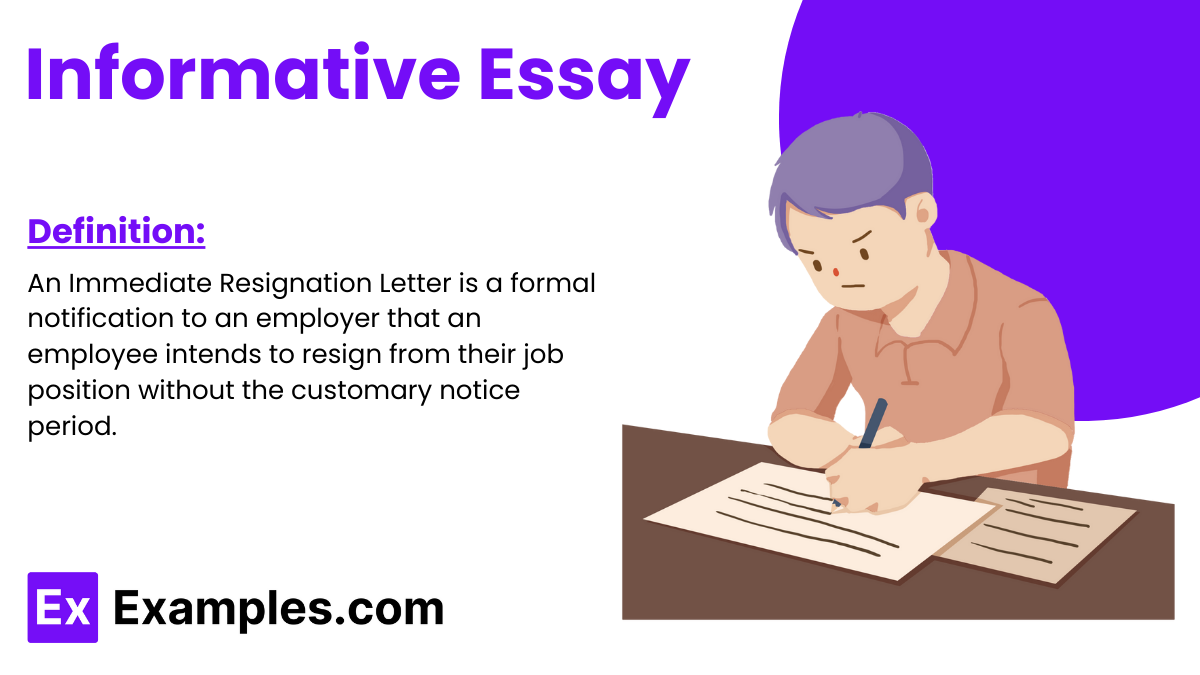
An Informative Essay stands out in the academic world as a tool for students to elaborate on specific topics with depth and clarity. By incorporating factual details and supporting evidence, these essays educate and enlighten the reader. This guide, enriched with practical essay examples , is tailored to assist students in mastering the art of crafting compelling and informative essays. Whether for school assignments or personal exploration, these examples provide valuable insights into effective informative essay writing.
What is an Informative Essay?
An informative essay is a genre of writing aimed at educating the audience on a particular topic or subject. This type of essay doesn’t just offer facts but also provides insights and explanations to help readers understand the subject matter more deeply. Unlike persuasive essays, which aim to convince readers of a particular viewpoint, informative essays are neutral; they do not express the writer’s personal opinions or arguments.
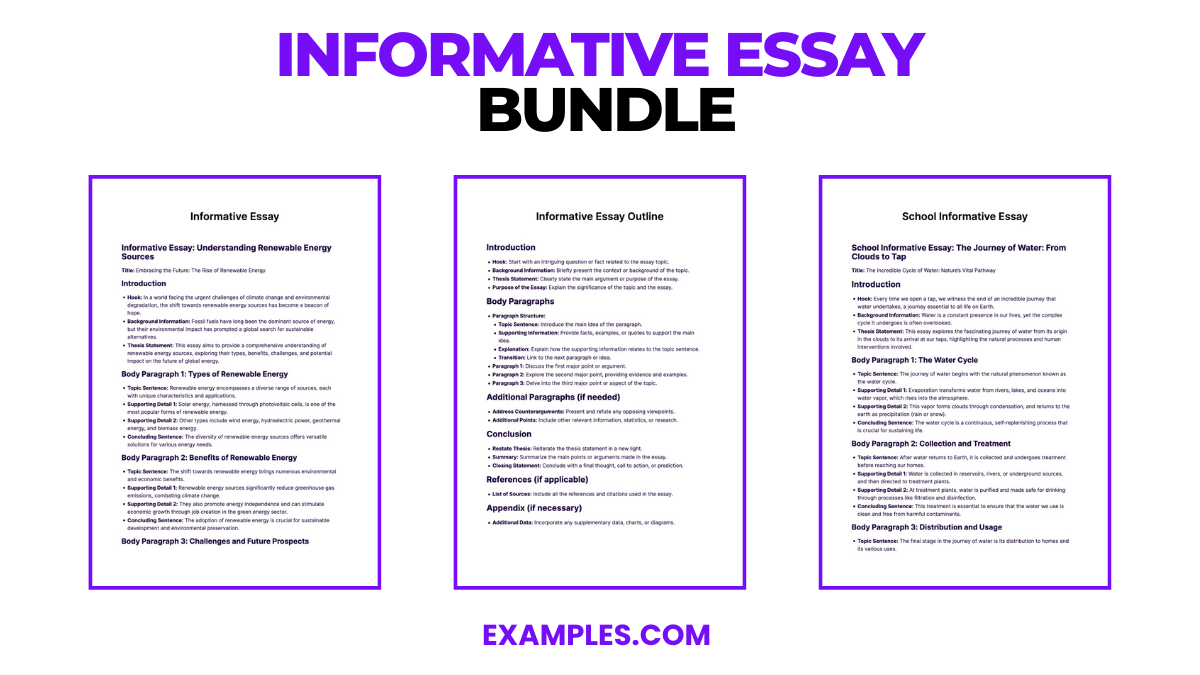
Download Informative Essay Bundle
You may have already been flooded with all these load of essays that your teacher asked you to write. You are probably thinking of a clever way on how to get away from the situation where you probably have not ever dreamed of. However, it is a task that we should all be thankful for. Essay writing actually brings more benefits than browsing through those social media platforms that you have already memorized. It does not only sharpen your minds and makes you more creative than putting likes and hitting shares of your friends’ post. The ability to share something from your mind is definitely a plausible act.
Informative Essay Format
Crafting an informative essay requires a structured approach to organize the wealth of information in a way that’s easily understandable to the reader. The format of an informative essay typically consists of three main parts: the introduction, the body, and the conclusion. Following this format helps in developing a coherent and logically flowing essay that effectively informs the reader.
Introduction
The introduction sets the stage for the entire essay. It should start with a hook that grabs the reader’s attention, such as a surprising fact, a question, or a vivid description of the topic. Following the hook, provide some background information to help readers understand the context of the essay. Finally, the introduction should end with a clear and concise thesis statement that outlines the main points or aspects of the topic that will be discussed. This statement acts as a roadmap for the essay, guiding the reader through the information presented.
Components of the Introduction: Hook : Engages the reader’s interest. Background Information : Provides context for the topic. Thesis Statement : Outlines the main points to be discussed.
Body Paragraphs
The body of an informative essay is where the main information is presented. It should be divided into paragraphs, with each paragraph focusing on a specific point or aspect of the topic. Start each paragraph with a topic sentence that introduces the point to be discussed. Follow this with supporting details, such as facts, examples, statistics, and quotes from credible sources. Each paragraph should be coherent and focused, contributing to the overall argument or presentation of the topic.
Structure of Body Paragraphs: Topic Sentence : Introduces the main idea of the paragraph. Supporting Details : Facts, examples, and evidence supporting the topic sentence. Transition : Smoothly connects to the next paragraph or point.
The conclusion of an informative essay wraps up the essay by summarizing the main points discussed. It should restate the thesis statement in a new way, reflecting the information presented in the essay. The conclusion can also highlight the importance or relevance of the topic, offering final insights or thoughts for the reader to consider. This section should leave the reader with a clear understanding of the topic and its significance. Elements of the Conclusion: Restatement of Thesis : Reflects the main points made in the essay. Summary of Main Points : Briefly recaps the key information discussed. Final Insight : Offers closing thoughts or implications of the topic.
Formatting Tips:
Use clear and concise language throughout the essay. Ensure each paragraph flows logically to the next. Cite sources where necessary to back up facts and claims. Keep the essay focused on informing the reader, avoiding personal opinions.
Types of Informative Essay
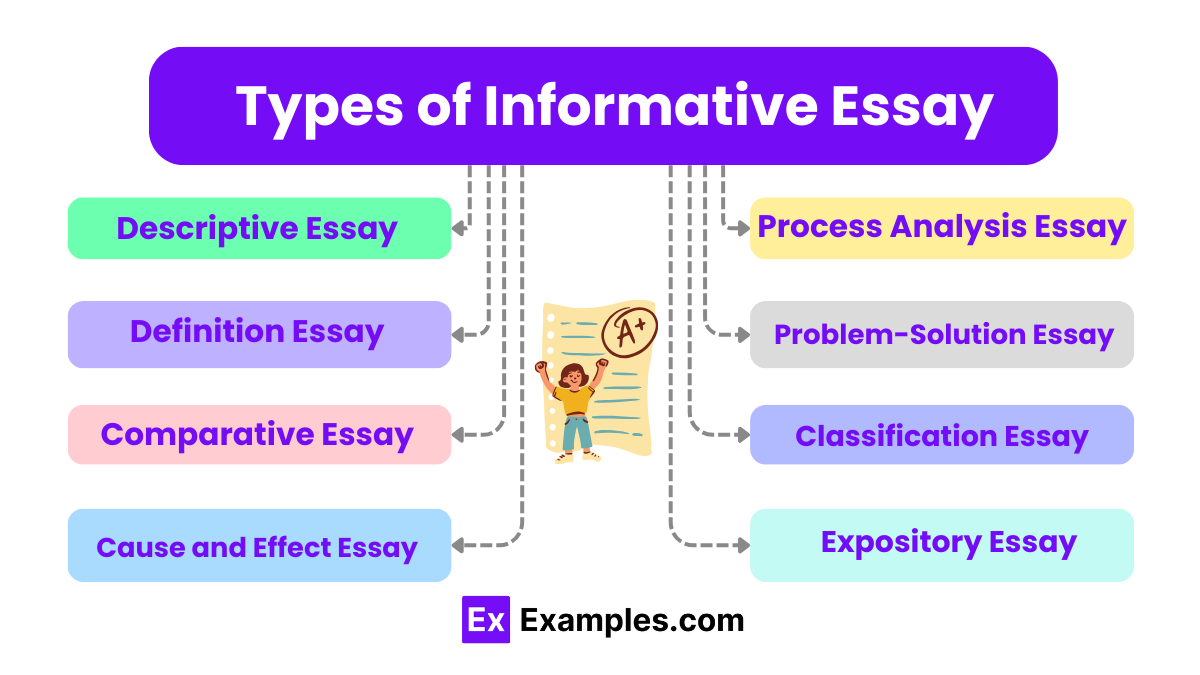
Download This Image
- Descriptive Essay : Provides a detailed description of a person, place, object, or event, using sensory details to paint a vivid picture for the reader.
- Definition Essay : Explores the meaning, history, and implications of a complex concept or term, offering a deep and thorough understanding beyond basic definitions.
- Compare and Contrast Essay : Analyzes two or more subjects by comparing their similarities and contrasting their differences, highlighting the nuances between them.
- Cause and Effect Essay : Examines the reasons why something happened (cause) and the outcomes that followed (effect), aiming to establish a clear relationship between events.
- Process Analysis Essay : Explains how something is done, how something occurs, or how something works, in a step-by-step format, providing clear instructions or insights.
- Problem-Solution Essay : Identifies a specific problem and proposes one or more solutions, focusing on presenting viable and effective ways to address the issue at hand.
- Classification Essay : Organizes or sorts different subjects or objects into categories based on shared characteristics, providing a clear understanding of their relationships and differences.
- Expository Essay : Presents a balanced analysis of a topic, using facts, statistics, and examples, aiming to explain or clarify a subject in a straightforward, unbiased manner.
How is an Informative Essay Structured?
An informative essay is structured in a clear, organized manner to effectively convey information to the reader. This structure consists of three main parts: the introduction, the body paragraphs, and the conclusion. Here’s how each part is typically organized:
- Hook : Begins with a captivating opening to grab the reader’s attention. This could be an interesting fact, a question, or a startling statistic related to the topic.
- Background Information : Provides context for the topic being discussed. This section gives the reader any necessary background information to understand the essay.
- Thesis Statement : Concludes the introduction with a clear, concise statement that outlines the main points or focus of the essay. This statement guides the rest of the essay.
- Topic Sentence : Each body paragraph starts with a topic sentence that introduces the main idea of the paragraph, relating back to the thesis statement.
- Supporting Details : These are facts, examples, or explanations that provide evidence to support the topic sentence. This may include statistics, quotes from credible sources, or logical arguments.
- Analysis : This section interprets the supporting details, explaining how they relate to the topic and the thesis statement. It’s where the writer’s insight comes into play, providing depth to the information presented.
- Transition : Each paragraph ends with a sentence that provides a smooth transition to the next paragraph, maintaining the flow of the essay.
- Summary of Main Points : Begins by briefly summarizing the key points or information presented in the body paragraphs, reinforcing the essay’s main ideas.
- Restatement of the Thesis : Reiterates the thesis statement in light of the information and analysis provided, emphasizing the essay’s main argument or focus.
- Closing Statement : Concludes with a final thought or call to action, leaving the reader with something to ponder or suggesting steps for further exploration of the topic
7 steps for Writing an Informative Essay
- Choose Your Topic : Select a topic that interests you and meets the assignment’s criteria. Ensure it is broad enough to research but narrow enough to be covered in your essay.
- Conduct Research : Gather information from reliable sources to understand your topic thoroughly. Look for facts, statistics, and examples that will provide a solid foundation for your essay.
- Create an Outline : Organize your thoughts and research into an outline. This will help structure your essay logically, ensuring a clear flow of ideas from the introduction through the body paragraphs to the conclusion.
- Write the Introduction : Begin with a hook to capture the reader’s interest, followed by background information to set the context for your topic. Conclude the introduction with a thesis statement that presents the main focus or argument of your essay.
- Develop Body Paragraphs : Each paragraph should focus on a single main idea that supports your thesis. Start with a topic sentence, followed by evidence and examples. Include your analysis to explain how this evidence relates to your topic.
- Conclude Your Essay : Summarize the main points of your essay, restate your thesis in light of the information provided, and offer a final thought or call to action. This is your chance to reinforce the importance of your topic and the information you’ve presented.
- Revise and Edit : Review your essay for any errors or unclear parts. Check for grammar, punctuation, and spelling mistakes. Ensure your writing is clear, concise, and logically organized. It may help to get feedback from others or to step away from your essay for a while before reviewing it again.
Purpose of Informative Essays
Informative essays serve a foundational role in educational and communication contexts, aiming to enlighten the reader on a specific topic or subject matter. The core purpose of these essays is to inform, explain, and educate without presenting the author’s opinion or persuading the reader to adopt a particular viewpoint. Here’s a deeper look into the primary objectives of informative essays:
Educate the Reader
The most direct purpose of an informative essay is to educate its audience. By presenting facts, data, and detailed explanations, the essay seeks to expand the reader’s knowledge on a given subject. This is particularly valuable in academic settings, where understanding diverse topics is essential to a well-rounded education.
Provide Clarity and Insight
Informative essays often tackle complex subjects that may be difficult to understand at first glance. Through clear writing and structured explanation, these essays break down intricate concepts into digestible parts, offering insight and clarity. They help the reader grasp the nuances of topics ranging from scientific theories to historical events and beyond.
Enhance Critical Thinking
By presenting information from various angles and including detailed analyses, informative essays encourage readers to engage in critical thinking. Readers are prompted to consider the hows and whys of the subject matter, analyze the information presented, and connect it to broader contexts or their personal knowledge.
Stimulate Interest
Although the primary aim is to inform, a well-crafted informative essay can also spark interest in the topic. By uncovering intriguing facts or presenting the subject in a compelling manner, the essay can motivate readers to explore the topic further on their own, fostering a culture of learning and curiosity.
Support Academic and Professional Success
In academic settings, informative essays are a tool for students to demonstrate their understanding of a topic, their ability to conduct thorough research, and their proficiency in communicating complex ideas. Professionally, these essays contribute to knowledge sharing within industries, helping individuals stay informed about current trends, innovations, and foundational concepts.
Build Foundation for Further Exploration
Informative essays lay the groundwork for deeper research and exploration. By providing a comprehensive overview of a topic, they equip readers with the basic knowledge necessary to delve into more specialized studies or related subjects, serving as a stepping stone for academic and personal growth.
10+Informative Essay Samples
15+ informative essay examples.
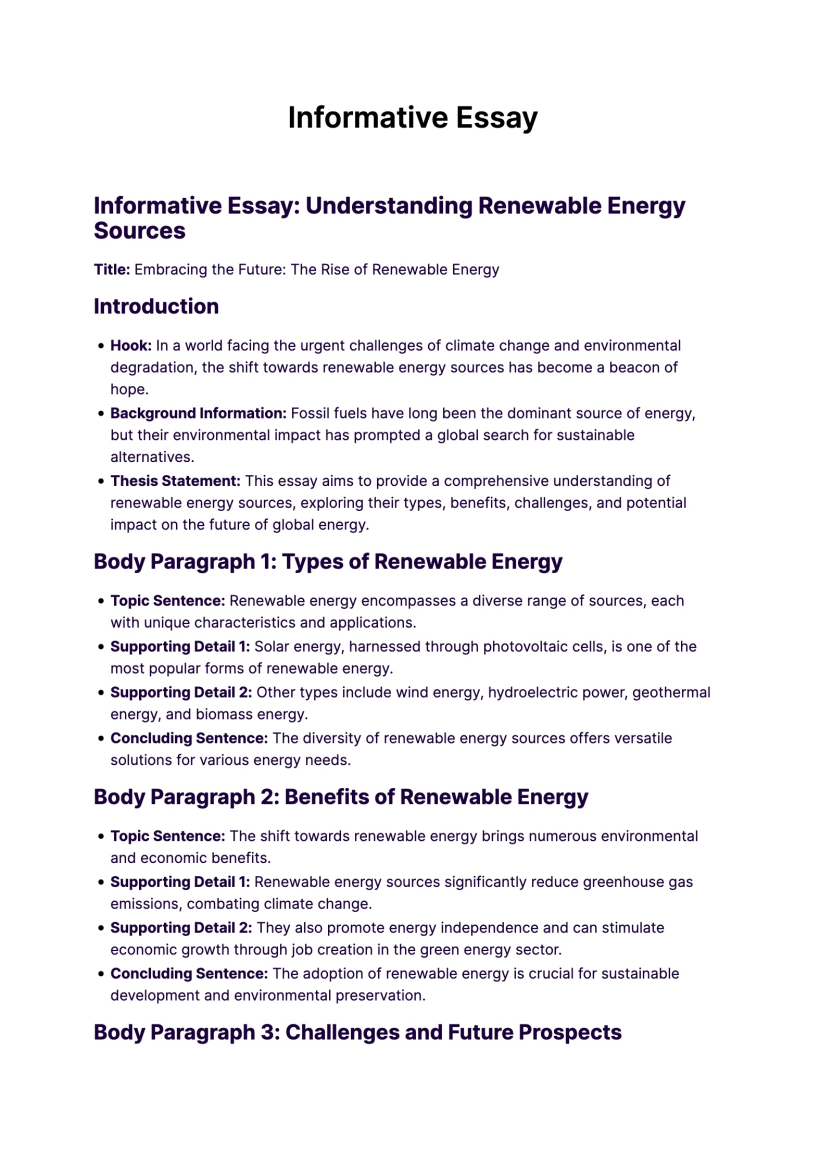
Free Download
Informative Essay Outline
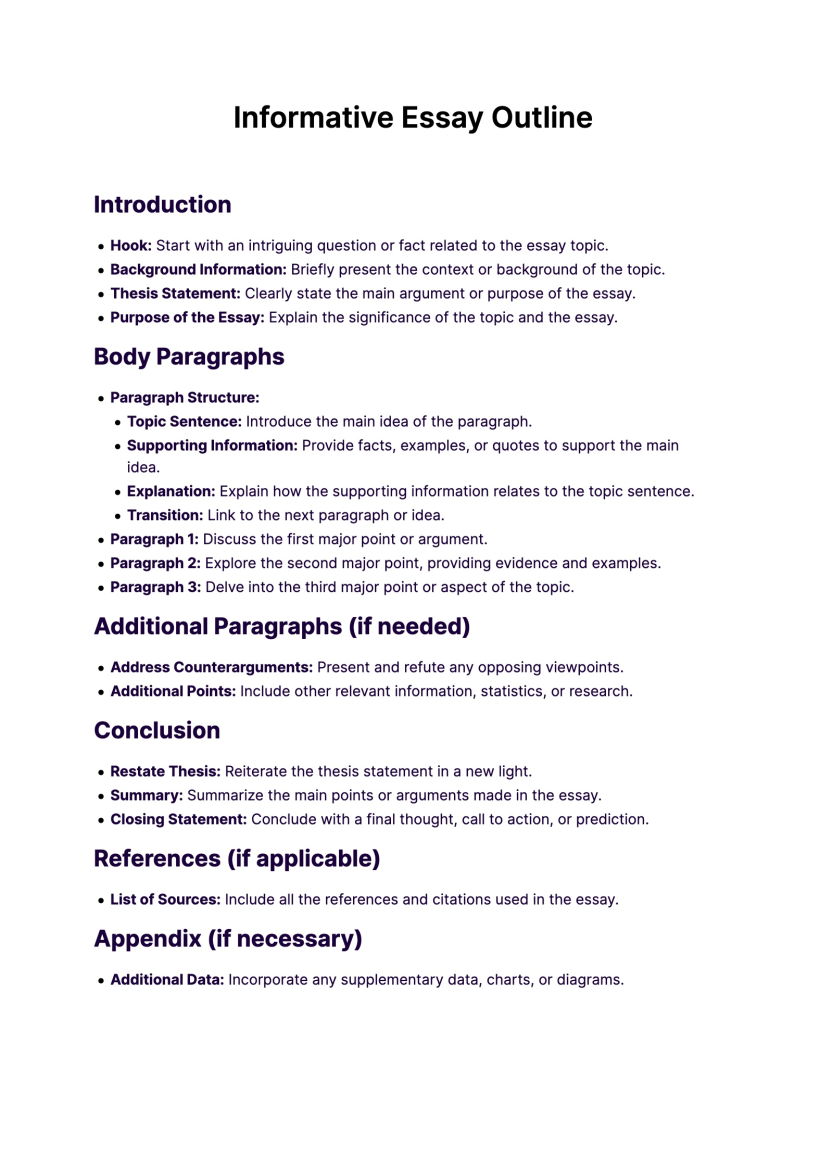
School Informative Essay
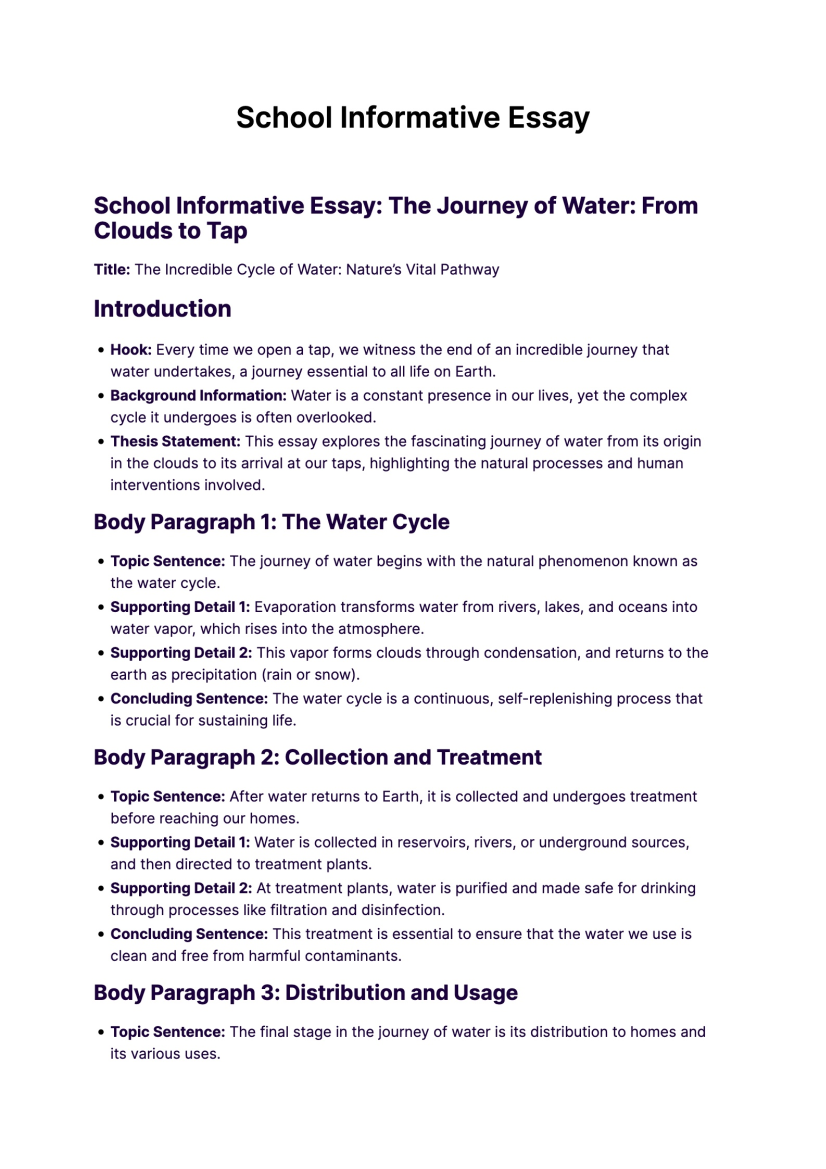
Informative Essay Example
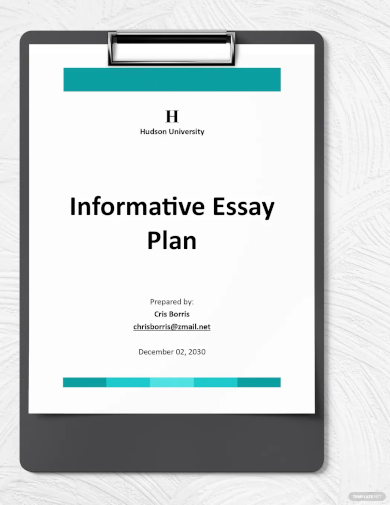
Expository Informative Example
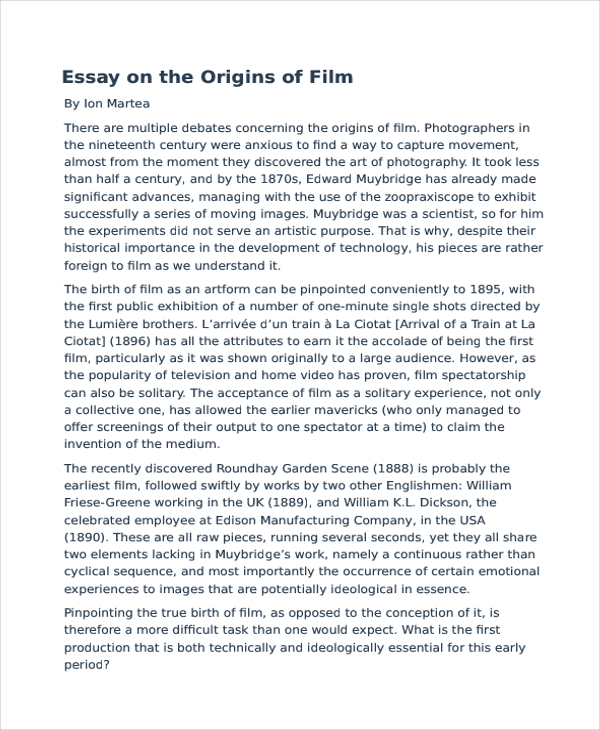
Student Informative Sample
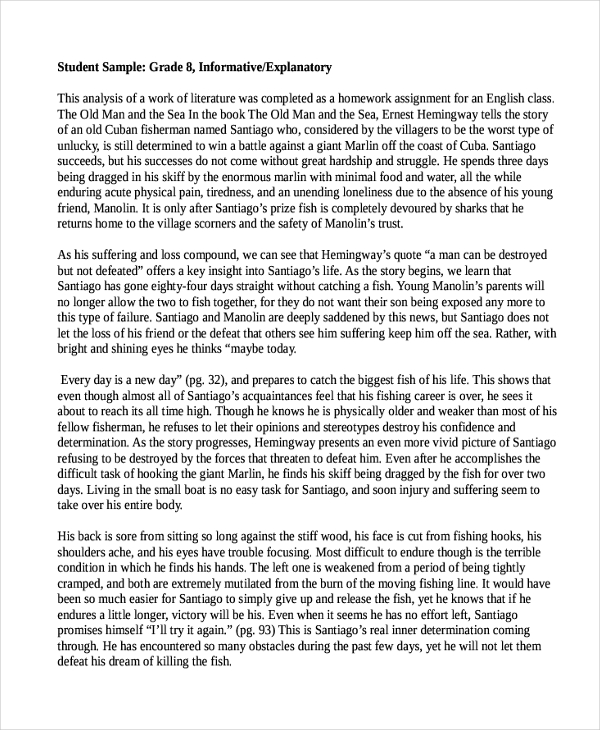
Short Informative Essay
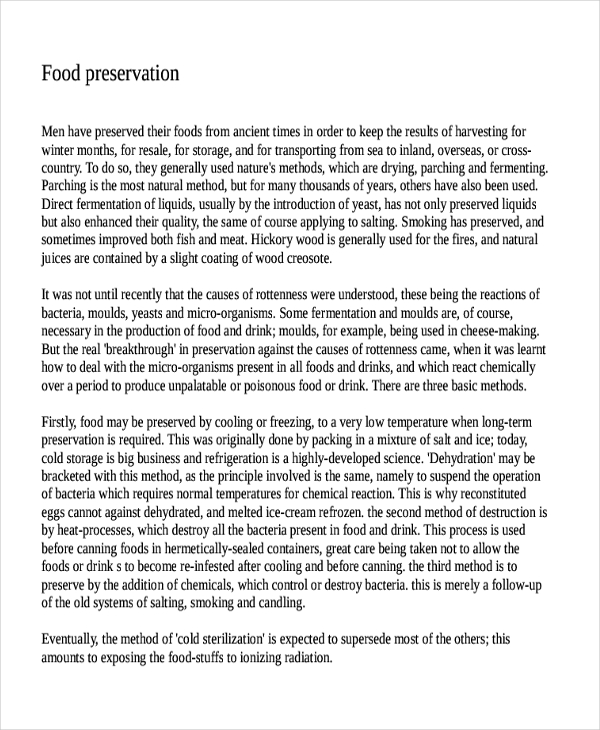
What Is an Informative Essay?
Informative essay is a written as literary essay piece with the purpose of educating a target audience or readers regarding a certain topic or subject.
It is intended to present or expose something while at the same time avoiding to present arguments or personal opinion from the writer. An informative essay is also sometimes called an expository essay in the sense that it also aims to expose or display an information which will be beneficial for the reader.
It does not present bias judgments nor favorable ideas. It does not also dwell in the concept of convincing readers to do things that are contrary to their will.
How to Write an Informative Essay
Writing an informative essay is like telling a blind person what is the color of the sky or telling a kid what are ice creams made of. You simply just have to present a topic and expand.
- Think of a topic. The first thing that you have to do is think of a topic that you want to right about. It would be good if it is something that you are most passionate about so you can write in great details.
- Create a format. The most effective format is using the essential parts of an essay .
- Present your ideas. After choosing the topic, start writing your ideas. Try to present it in a way that you are educating the readers.
College Informative Essay
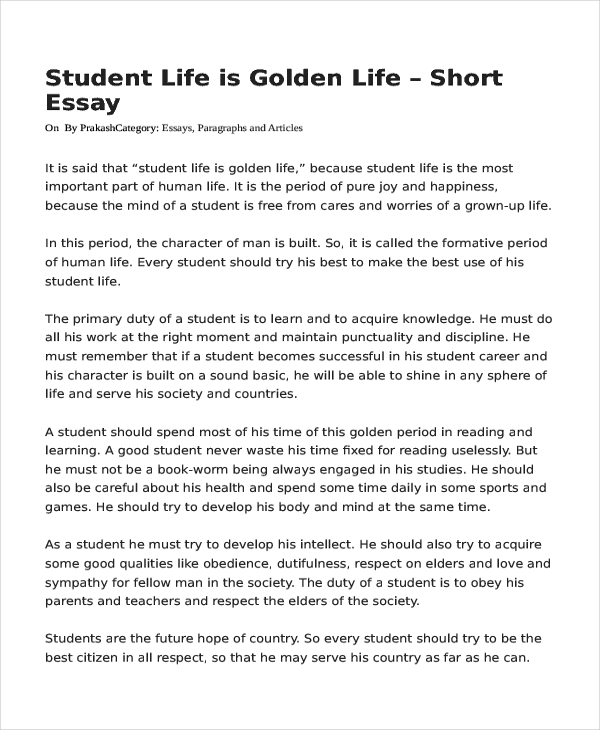
Middle School Informative

Narrative Informative Example
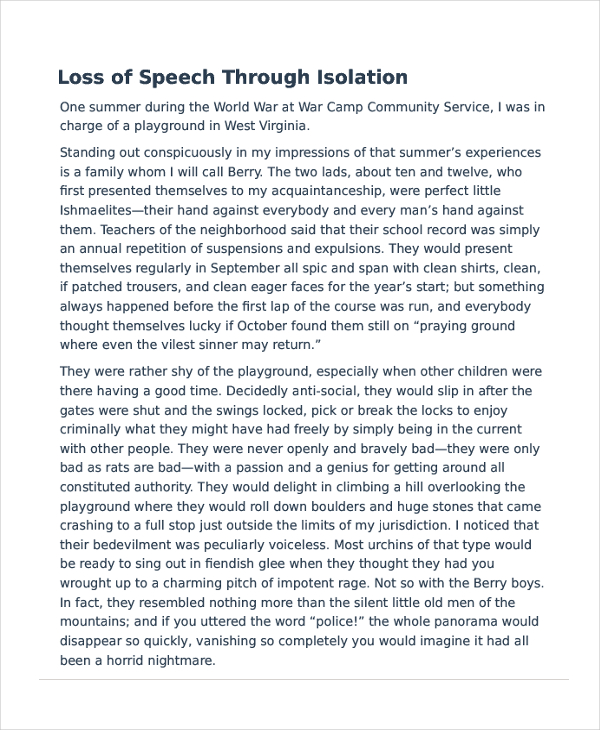

Informative Essay Example
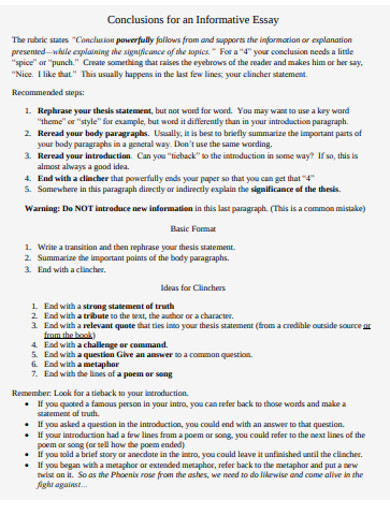
Sample Informative Essay
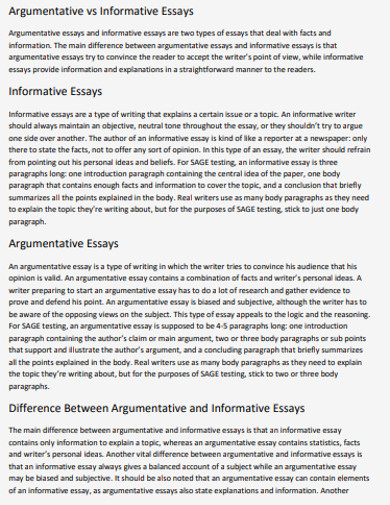
Informative Organizer Essay
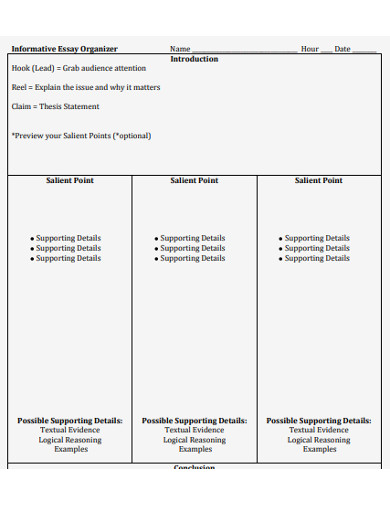
Informative Assignment Essay
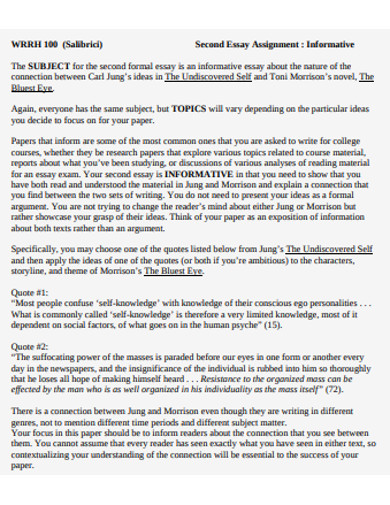
Uses of Informative Essay
1. educational tools.
- Learning and Teaching : Informative essays are widely used in educational settings to teach students about specific topics. They serve as a means for students to research, organize, and present information, enhancing their learning process. For educators, these essays are a tool to assess students’ understanding and ability to communicate knowledge effectively.
2. Enhancing Understanding
- Complex Concept Clarification : These essays break down complex concepts into more understandable parts, making it easier for readers to grasp difficult subjects. They can demystify scientific principles, historical events, or technological advancements, providing clarity and insight.
3. Communication of Ideas
- Knowledge Sharing : In professional and academic communities, informative essays facilitate the sharing of knowledge and ideas. They allow experts to communicate findings, theories, and analyses, contributing to the collective understanding of a field.
4. Awareness and Information Dissemination
- Public Awareness : Informative essays play a crucial role in raising awareness about important issues, such as health, environmental concerns, and social justice. By presenting facts and information, they help inform public opinion and encourage informed decision-making.
5. Basis for Further Research
- Foundation for Exploration : These essays provide a foundation for further research. By offering a comprehensive overview of a topic, they can inspire readers to explore subjects in greater depth, paving the way for advanced studies and discoveries.
6. Professional Development
- Skill Enhancement : Writing informative essays helps individuals develop valuable skills, including research, critical thinking, organization, and writing. These skills are essential in many professional contexts, enhancing career prospects and professional competence.
7. Decision Making and Problem Solving
- Informed Decisions : In the business world and personal life, informative essays can provide the necessary background to make informed decisions. Understanding all aspects of a situation or topic can lead to better problem-solving strategies and outcomes.
8. Cultural and Social Engagement
- Cultural Insight : Essays about cultural practices, societal trends, and historical backgrounds offer readers insights into different ways of life and perspectives, promoting cultural understanding and empathy.
9. Personal Growth
- Intellectual Stimulation : Reading and writing informative essays can be intellectually stimulating, encouraging curiosity and a love for learning. They can broaden one’s horizons and foster a more informed and thoughtful perspective on the world.
Importance of Informative Essay
- Facilitates Learning and Education : They are essential tools in educational settings, helping students learn and understand various topics across different subjects.
- Promotes Critical Thinking : Writing and reading informative essays encourage critical thinking by requiring analysis and synthesis of information.
- Enhances Research Skills : The process of writing an informative essay improves research skills, teaching individuals how to gather, evaluate, and organize information effectively.
- Improves Writing and Communication Skills : Informative essays help in honing writing skills, including structuring arguments, maintaining clarity, and engaging the audience with informative content.
- Encourages Intellectual Curiosity : They stimulate curiosity about the world, encouraging readers and writers to explore topics deeply and broadly.
- Supports Informed Decision Making : By presenting facts and data, informative essays enable readers to make decisions based on knowledge and insights rather than assumptions or misinformation.
- Builds a Foundation for Further Study : They lay the groundwork for more in-depth research and analysis, serving as a stepping stone to more specialized studies.
- Spreads Awareness on Important Issues : Informative essays are a powerful medium for raising awareness about social, environmental, and health-related issues, contributing to public education and action.
- Promotes Cultural Understanding and Empathy : Essays on cultural and societal topics promote understanding and empathy towards different communities and ways of life.
- Contributes to Professional Development : The skills gained from researching and writing informative essays are valuable in professional settings, enhancing abilities in documentation, presentation, and critical analysis.
- Serves as a Source of Inspiration : Reading informative essays can inspire new ideas, hobbies, or even career paths by introducing readers to previously unknown subjects or deeper aspects of familiar topics.
- Facilitates Clear and Effective Information Dissemination : In both academic and professional contexts, the ability to clearly and effectively disseminate information is critical, and informative essays are an excellent medium for this purpose.
How Do You Start an Informative Essay Sentence?
Start an informative essay sentence with a hook such as a surprising fact, a question, or a quote to grab the reader’s attention and draw them into the topic.
How Do You Structure an Informative Essay?
Structure an informative essay with an introduction that includes a hook and thesis statement, body paragraphs that explore the topic in detail, and a conclusion that summarizes the main points.
What Should Each Body Paragraph Begin With?
Each body paragraph should begin with a topic sentence that introduces the main idea of the paragraph, directly supporting the thesis statement.
What Are the Informative Writing Techniques?
Informative writing techniques include using clear and concise language, organizing information logically, employing facts and data for support, and incorporating visuals like charts or graphs to enhance understanding.
How Do You Start an Informative Letter?
Start an informative letter with a polite greeting, followed by a clear introduction of the purpose of the letter. Provide the necessary information in a concise and organized manner.
What Are the Parts of an Informative Essay?
The parts of an informative essay include the introduction with a hook and thesis statement, body paragraphs with topic sentences and supporting details, and a conclusion that summarizes the essay’s main points.
The basic parts or elements of an essay are the introduction, the body, and the conclusion. These are all important parts which of course constitutes the wholeness of your essay.
So each part has to be given with special importance. The conclusion of essay , which is the last part, should be your chance to make your readers understand the whole point of your topic.
This is the chance for you to clarify some important things that you want to highlight. It is advisable that you write at least three to five sentences for your conclusion in order for it not to become too explanatory which you have already done on the previous part.

Informative Essay Generator
Text prompt
- Instructive
- Professional
Crafting the Perfect Thesis for Your Informative Essay
How to Research Effectively for an Informative Essay
Structuring Your Informative Essay: A Step-by-Step Guide
Selecting the Best Topic for Your Informative Essay
The Importance of Editing Your Informative Essay
Incorporating Visuals into Your Informative Essay
Tips for Writing an Engaging Informative Essay Introduction
Developing Strong Arguments in Your Informative Essay
Informative Essay Conclusion: Leaving a Lasting Impression
Avoiding Plagiarism in Your Informative Essay
How To Write An Informative Essay
- Essay Writing Guides

If you have been looking at the blank MS Word document for a couple of hours attempting to write something meaningful in your informative essay, you’re in the right place. Today, you will learn the informative essay definition, master this paper with ease, and get the highest grades. Read the guide from our essay service to discover how to craft a worthy informative essay.
What is an Informative Essay?
An informative essay is a paper that provides information on a specific topic. In other words, it educates the reader about a particular thing, be it a term, event, natural phenomenon, etc.
An informative essay doesn’t contain the author’s evaluation or analysis. Instead, it aims to describe a subject. What does this essay look like? In essence, most Wikipedia articles are informative essays since they provide you with information on a particular topic .
Due to this, you might be lucky if you are assigned to write an informative essay, since it’s one of the simplest academic writing tasks.
Informative Essay Purpose
The informative essay aims to explain a particular subject. But what does it mean? It means you need to tell your reader about the topic’s origin, causes, effects, etc. Let’s exemplify it with some historical events, like WW2:
- When did WW2 start?
- Who and why did initiate it?
- What are the main WW2 events?
- How did it end?
- What countries did engage in WW2?
- What implications did it involve?
Informative Essay Outline
All essay types share the same logic when it comes to outlining. Therefore, your informative essay structure must contain the following elements:
Introduction
Essays share some introduction features. Informative one is no exception: your introduction must contain a hook, background facts, a thesis statement, and the transition sentence.
What is an essay hook? It is a couple of the very first sentences of your essay introduction that spark your readers’ interest. You can include some eye-opening statistics and add some wordplay. After that, you may want to add background information that will evolve into the thesis statement.
Thesis Statement
A thesis statement is the main topic your essay will revolve around. A good rule of thumb is to narrow down your thesis statement so that you can fit into the required word count without compromising your research quality. After writing a thesis statement, you need to include a logical transition to your essay body.
You will describe your topic in the essay body. Usually, it will contain several paragraphs, depending on your topic complexity and the required word count. The crucial point is to follow the sequence of events and make logical transitions between the essay parts. Consequently, each body paragraph must contain:
- A topic sentence that explains the paragraph’s main point and connects it to the previous one.
- Information: facts, statistics, and thesis-supporting evidence.
- Mini-conclusion. Summarize your paragraph and add a transition to the next one.
Repeat this pattern while writing each body paragraph to make your essay sound clear and logical.
An informative essay conclusion contains the following elements:
- The restated thesis statement.
- A summary of body paragraphs.
- The final word.
How to Write an Informative Essay Introduction?
How to start an informative essay? First and foremost, it doesn’t require proving or debunking some beliefs or analyzing something. That’s why popular hooks like provocative rhetorical questions may not be suitable for this paper.
However, you may want to play with the readers’ awareness. Take a look at the introduction hook example on the global deforestation topic: Do you know that people remove 40,000 square miles (the size of Iceland) of forest each year? By wrapping striking facts into rhetorical questions, you can quickly grab your readers’ attention.

Need expert help with your essays, but also want to save some money?

How to Write an Informative Essay Thesis?
The thesis statement can render the meaning of your paper title. For example, your topic is Amazonian deforestation.
Think of what to write about: when Amazonian deforestation started, what countries remove the most trees, what implications deforestation involves, etc.
In this case, you have to provide a thesis statement that will set a direction for your paper so that you can uncover more and more details in your essay body.
So the thesis statement for this topic might sound like this: Deforestation of the Amazonian rainforest makes an unprecedented impact on the local biodiversity and climate . At this point, you have defined your essay’s direction: you will mention extinct species, changing rain patterns, rainforest loss rates, etc.
Note that you should make your thesis statement sound non-controversial. It has to be a fact (like deforestation implications) rather than an opinion/argument.
Remember that informative essays don’t involve debates.
How to Write an Informative Essay Body?
The essay body aims to bring more details to your thesis statement. It would be much better if you added headings for each part of your subject. In this way, it will be much easier for you to follow the essay direction. Also, you can use headings from H1 to H4. Take a look at the example on how to do that:
- H1 Amazonian Rainforest Deforestation: Causes and Implications .
- H2 When Did the Amazonian Deforestation Start ?
- H2 Main Amazonian Deforestation Drivers
- H2 Rainforest Loss Rates
- H3 Brazilian Rainforest Loss Rates
- H2 Amazonian Rainforest Deforestation Implications
- H3 Global Temperature Rise
- H3 Global Sea Level Rise
- H3 Massive Extinction of Rainforest Species
- H2 The Bottom Line.
Are you ready to get things finally done?

How to Write an Informative Essay Conclusion?
The essay conclusion should provide a sense of completeness. For this, you should rephrase the thesis statement first. Please note that you need to give your rephrased thesis statement a new meaning based on the provided facts and conclusions.
After that, summarize your essay body in a couple of sentences. At the end of your conclusion, sum up the whole paper within the final line.
How to Choose a Topic for an Informative Essay?
Usually, professors provide their students with essay topics. But if you are free to choose one on your own, you are lucky. Check these tips for choosing informative essay topics:
- Check for informative essay ideas on the web. Many websites list hundreds of topics for all academic levels.
- Select narrow topics instead of broad ones if you wish to get a meaningful, well-researched essay – it’s impossible to cover a general topic.
- Make sure you can find enough information on your subject. For this, do a quick research on a couple of topics before writing an informative essay.
Informative Essay Examples
Here are some informative paper examples you can use anytime you feel uncertain about how to properly organize and write your paper:
- The War Within
- The Miracle Worke
- An informative essay about traveling
Informative Essay Writing Tips
Feel free to check the following tips if you wish to write an outstanding informative essay and get the highest grade for it:
Note Your Ideas
You may struggle to keep in mind all the ideas regarding your essay. So it would be excellent to note and list them before writing your first draft.
Make Up an Outline
Research your selected subject and draft your essay outline first to save you time. Once you get a clear and logical paper structure, you will write your essay step-by-step without a problem.
Use Writing Tools
Using citation machines is the best way to follow the required informative essay format and list all the used sources with ease. You can also use grammar checkers like Grammarly and plagiarism detection software to polish your paper.
Proofread Your Essay the Next Day
You might not notice all the errors in your essay right after completing your draft. Due to this, you may want to let your vision and mind have a rest. For this, proofread your piece the next day.
Write My Informative Essay for Me, Please!
Writing an informative essay is easier than you think. This academic paper requires you to describe a given or chosen topic in detail, with facts, statistics, and explanations. If you still struggle to grasp the informative essay meaning or have no time for it, you can ask professional Ph.D. writers from our essay writing service to craft this paper for you. All you need to do is create an account, place an order, and wait for the delivery.
- Academic Writing Guides
- Citation Guides
- Essay Samples
- Essay Topics
- Research Paper Topics
- Research Paper Writing Guides
- Study Tips and Tricks
Featured articles

Start Writing Formal Emails
In today’s digital age, formal emails are a crucial form of communication in various professional settings. They reflect one’s professionalism and competence, making them essential for effective communication in workplaces, academic institutions, and business environments. Crafting well-written formal emails is invaluable for building and maintaining professional relationships, and they are often the initial point of […]
Author: Marina Kean

We’ll Help You Write Career Goals Essays
Career goals essays are important for expressing personal ambitions and objectives in the professional realm. They can greatly impact college applications, job interviews, scholarship submissions, and career advancement initiatives. These essays about career goals have the power to showcase an individual’s determination, visions, and unique brand, opening doors to academic programs, job opportunities, and funding. […]
Informative Essay Topics to Suit Every Preference

Exploring the best informative essay topics unveils a wealth of intellectual treasures, with surprises around every corner. Consider this: Honey never spoils. Archaeologists have unearthed pots of honey in ancient Egyptian tombs that are over 3,000 years old and still perfectly edible. Much like the timeless nature of honey, the world of informative essays offers an enduring appeal, providing a reservoir of knowledge that withstands the test of time. Whether you're delving into the wonders of nature, the pages of history, or the intricacies of modern science, the choices are as diverse and enduring as the golden sweetness of honey.
Short Description
Discover the essence of informative writing as our paper writing experts delve into what is an informative essay and unravel the art of selecting a compelling topic. Navigate through the intricacies of crafting a well-rounded essay that both educates and captivates. From understanding the structure to polishing your prose, our exploration extends to the nuances of creating an informative masterpiece. Uncover a treasure trove of possibilities as we present a comprehensive list of topics spanning the realms of science, history, technology, and beyond.
What Is an Informative Essay
In the academic landscape, an informative essay stands as a unique form of writing with the primary objective of imparting knowledge rather than steering opinions. This genre encapsulates a diverse array of subjects, ranging from the historical trajectory of the Internet to the tangible advantages associated with meditation practices. What distinguishes these essays is their adaptability, accommodating various writing styles such as descriptive, comparative, cause and effect, and even narrative approaches.
What makes informative essays intellectually invigorating is their demand for thorough research. Engaging in this writing process is akin to embarking on a scholarly exploration, requiring the unearthing of insightful information to enhance one's understanding of a given topic. The underlying charm lies not only in the broad spectrum of subjects but also in the commitment to presenting information objectively, ensuring its accuracy and reliability.
Contrary to being exclusive to academia, this type of essay writing offers a pathway for inquisitive minds to expand their knowledge horizons. They serve as an accessible invitation for anyone seeking to gain insights into new realms. The significance of these essays lies in their capacity to empower readers through the delivery of factual, unbiased information.
In the following section, we'll unravel the process of choosing topics for informative essays that not only intrigue but also contribute to the broader tapestry of knowledge acquisition.
Don't Have the Time or Skills to Write Articles Yourself?
Let our professional writing services do the work for you
How to Choose Informative Essay Topics
Choosing the right informative essay topic is essential for crafting an engaging and insightful piece. The topic should be interesting, relevant, and informative. So, what is the first step to creating an informative essay? Here are five tips from our custom essay writing service for selecting a great topic for an informative essay:
.webp)
Identify your interests and passions - Start your informative essay journey by tapping into your passions and interests. Consider topics that resonate with you personally, whether it's a hobby, a specific field, or an experience you've encountered. This personal connection not only makes the research process more enjoyable but also enriches your writing with genuine enthusiasm.
- Example: If you're passionate about environmental sustainability, you might explore ideas for informative essay like the impact of urbanization on local biodiversity, the effectiveness of recycling programs, or innovations in eco-friendly technologies.
Research current events and trends - Stay in the know by researching current events and trends that capture your interest. This approach ensures that your informative essay remains relevant and addresses topics that are both timely and engaging.
- Example: Dive into topics such as the influence of social media on public discourse, the evolving landscape of remote work, or the ethical considerations surrounding emerging technologies like artificial intelligence.
Consider your audience - Tailor your informative essay to your audience by considering their age group, interests, and needs. Think about what would resonate with them and what knowledge they might find valuable or intriguing.
- Example: If your audience comprises young adults, you might explore topics like the impact of social media on mental health, sustainable lifestyle choices, or the role of technology in shaping future career paths.
Focus on a specific aspect of a broader topic - Narrow down broad topics to a specific aspect, allowing for a focused and in-depth exploration in your essay.
- Example: Instead of tackling the broad theme of 'global health,' narrow your focus to the impact of a specific disease on a particular demographic or the effectiveness of a public health intervention in a specific region.
Brainstorm with others - Collaborate with peers, classmates, or colleagues to brainstorm informative essay ideas. Engaging in discussions with others can bring fresh perspectives and novel ideas to the table.
- Example: Discuss with classmates the potential informational paper topics related to advancements in technology, environmental sustainability, or societal changes. Their insights might lead to unique angles or specific aspects of these broad themes that you hadn't considered.
A List of Good Informative Essay Topics
The key to a compelling, informative essay lies in selecting the right topic, a choice that significantly influences the quality and engagement of your piece. With numerous options available, the challenge often lies in where to begin. In the following paragraphs, we'll delve into various informational topics to write about, spanning current events, social issues, science, and technology, offering a diverse array of subjects for students. These topics not only provide ample opportunities for research but also cater to different purposes—whether your goal is to educate, persuade, or simply inform. So, let's explore some great informative essay examples , sparking inspiration and setting you on a path for a successful academic writing journey!
Easy Informative Essay Topics
These easy informative essay topics are great starting points for those who want to write a straightforward and informative essay without getting too complicated.
- The Basics of Healthy Eating: Simple Tips for a Balanced Diet
- The Impact of Social Media on Everyday Life
- How Recycling Benefits the Environment: Easy Steps for a Greener Tomorrow
- The History and Significance of Traditional Festivals in Your Culture
- Understanding the Basics of Climate Change: A Beginner's Guide
- The Wonders of Space Exploration: A Journey into the Cosmos
- The Influence of Music on Mood and Productivity
- The Evolution of Video Games and Their Impact on Society
- DIY Home Gardening: Tips for Growing Your Own Vegetables
- The Importance of Regular Exercise for Mental and Physical Health
- How to Develop Effective Study Habits for Academic Success
- The World of Endangered Species: Conservation and Awareness
- The Process of Photosynthesis: Unraveling the Mystery of Plant Growth
- Exploring Cultural Diversity: Traditions and Customs Around the Globe
- The Fundamentals of Personal Finance: Budgeting for Beginners
- A Journey into the History of Your Local Community
- The Impact of Technology on Education: Advantages and Challenges
- Understanding Different Types of Renewable Energy Sources
- The Benefits of Mindfulness and Stress Reduction Techniques
- The Basics of First Aid: Essential Skills Everyone Should Know
Informative Essay Topics for Middle School Students
The following informative paper topics are tailored specifically for middle school students and cover a wide range of subjects that are both interesting and relevant to their age group.
- The Life Cycle of Butterflies: A Fascinating Journey from Caterpillar to Butterfly
- The Impact of Bullying on Mental Health: Recognizing and Preventing Bullying in Schools
- Exploring Ancient Civilizations: The Wonders of Egypt, Greece, and Rome
- The Science Behind Volcanoes: How They Erupt and Shape the Earth
- The Importance of Reading: How Books Can Broaden Your Horizons
- The Role of Bees in Pollination: Why Bees are Essential to Our Ecosystem
- The Solar System: A Tour of Planets, Moons, and Beyond
- The Intriguing World of Mythical Creatures: From Dragons to Unicorns
- Internet Safety: Tips for Navigating the Online World Responsibly
- The Process of Photosynthesis: How Plants Convert Sunlight into Energy
- The Basics of Coding: An Introduction to Computer Programming
- Understanding Different Forms of Energy: From Solar to Wind Power
- The Water Cycle: Exploring the Journey of Water on Earth
- Discovering Native American Cultures: Traditions and Heritage
- The Impact of Fast Food on Health: Making Informed Dietary Choices
- The Importance of Wildlife Conservation: Protecting Endangered Species
- The History of Animation: From Flip Books to Digital Cartoons
- Healthy Screen Time Habits: Balancing Technology and Well-being
- The Human Digestive System: How Our Bodies Process Food
- Exploring Career Options: What You Can Be When You Grow Up
Informative Essay Topics for High School Students
Here are some great essay topics for high school students. Our college essay writing service recommends conducting thorough research, providing evidence to support your claims, and presenting your findings in a clear and organized manner.
- The Influence of Social Media on Political Movements: Examining Modern Activism
- The Impact of Artificial Intelligence on the Job Market: Challenges and Opportunities
- The History and Cultural Significance of Hip-Hop Music
- The Rise of E-Sports: A Look into the World of Competitive Video Gaming
- Exploring the Benefits and Drawbacks of Virtual Reality Technology
- The Relationship Between Mental Health and Teenage Social Media Use
- The Evolution of Feminism: A Comprehensive Analysis of its Waves and Impact
- The Science Behind Climate Change: Understanding the Causes and Effects
- The Intersection of Technology and Privacy: Navigating the Digital Age
- The Impact of Globalization on Local Cultures: Challenges and Adaptations
- The Role of Genetics in Human Health: Unlocking the Secrets of DNA
- The History and Impact of the Civil Rights Movement
- The Ethical Implications of Gene Editing: CRISPR Technology and Beyond
- The Psychology of Decision-Making: Understanding Behavioral Economics
- The Effects of Sleep Deprivation on Academic Performance and Health
- The Influence of Popular Culture on Teenagers: Music, Fashion, and Trends
- The Future of Renewable Energy: Innovations and Sustainable Practices
- The Significance of Space Exploration in Advancing Scientific Knowledge
- The History and Impact of the Internet: From ARPANET to the World Wide Web
- The Role of Education in Combating Climate Change: Building a Sustainable Future
Informative Essay Topics for College Students
Here are some informative essay topics for college students that span a wide range of subjects that will help you in your academic and professional endeavors.
- Here are some informative essay topics for students that span a wide range of subjects that will help you in your academic and professional endeavors.
- The Impact of Artificial Intelligence on the Future Job Market: Adapting to Change
- Exploring the Link Between Mental Health and Academic Performance in College
- The Role of Social Media Influencers in Shaping Consumer Behavior
- The Intersection of Technology and Healthcare: Innovations in Medical Practices
- Understanding Cryptocurrency: The Rise of Bitcoin and Its Implications
- The Psychology of Procrastination: Causes, Consequences, and Coping Strategies
- The Influence of Political Polarization on College Campuses: Navigating Diverse Perspectives
- The Evolution of Sustainable Practices in Business: Corporate Responsibility
- The Impact of Climate Change on Global Health: Risks and Mitigation
- The Future of Space Exploration: Mars Colonization and Beyond
- The Role of Artificial Intelligence in Enhancing Education: Opportunities and Challenges
- The Psychology of Decision-Making in Financial Investments
- The Influence of Cultural Diversity on College Campuses: Building Inclusive Communities
- The Ethical Considerations of Genetic Engineering: Implications for Future Generations
- The Effects of Social Media on Political Activism: Mobilizing the Youth Vote
- The History and Impact of Cybersecurity: Protecting Digital Frontiers
- The Relationship Between Diet and Mental Health: Exploring the Gut-Brain Connection
- The Challenges and Opportunities of Remote Work in a Globalized Economy
- The Impact of Artificial Intelligence on Creative Industries: Redefining Art and Entertainment
- The Role of Renewable Energy in Addressing Global Energy Challenges: A Sustainable Future
Fun Informative Speech Topics
These fun, informative speech topics are designed to engage and entertain audiences while still providing informative and educational content.
- The Science Behind Laughter: How Humor Affects the Brain
- Unusual Hobbies: Exploring the World of Extreme Ironing and Underwater Pumpkin Carving
- The History of the High-Five: Origins and Cultural Significance
- The Secret Lives of Cats: Decoding Feline Behavior
- The Art of Napping: Benefits and Strategies for Optimal Power Naps
- The Surprising Benefits of Chocolate: More Than Just a Sweet Treat
- The Strange World of Competitive Eating: From Hot Dogs to Pumpkin Pie
- The History and Impact of Internet Memes: How They Shape Online Culture
- The Quirky Side of Science: Bizarre Experiments and Curious Discoveries
- The Joy of Random Acts of Kindness: Simple Ways to Spread Positivity
- The Fascinating World of Optical Illusions: Playing Tricks on the Mind
- The Evolution of Dance: From the Twist to TikTok Trends
- The Power of Positive Thinking: Boosting Mental Health with Optimism
- The Unusual Origins of Common Phrases: Exploring Idioms and Sayings
- The Benefits of Laughter Yoga: Combining Chuckles and Mindfulness
- The Art of Juggling: Coordination, Focus, and Entertainment
- The Strange Habits of Historical Figures: From Einstein's Forgetfulness to Newton's Eccentricities
- The Science Behind Why We Love Puppies and Kittens: The Cuteness Factor
- The Joy of Board Games: Navigating the World of Modern Tabletop Games
- The History and Art of Karaoke: From Japanese Bars to Global Singing Phenomenon
Creative Informative Speech Topics
These creative essay topics are designed to spark curiosity and interest in unique and unconventional subjects.
- The Art of Origami: Crafting Intricate Designs with Paper Folds
- The Impact of Color Psychology on Marketing and Consumer Behavior
- Creative Ways to Upcycle Everyday Items: From Trash to Treasure
- The World of Augmented Reality Art: Merging Digital and Physical Realms
- The Evolution of Street Art: From Graffiti to Urban Masterpieces
- The Influence of Music on Creativity and Productivity
- The Intricacies of Food Styling: Making Meals Look as Good as They Taste
- The Power of Storytelling in Advertising: Crafting Compelling Narratives
- The Art of Mind Mapping: Unleashing Creativity and Boosting Productivity
- The Psychology of Creativity: Exploring the Creative Process
- The Impact of Architecture on Human Emotions: Designing Spaces for Well-being
- Creative Problem Solving: Techniques for Thinking Outside the Box
- The Intersection of Science and Art: BioArt and Genetic Engineering
- The Rise of Immersive Theater: Engaging Audiences in Unique Experiences
- The Art of Cinematography: Capturing Moments in Living Photos
- The Unique World of Steampunk: Blending Victorian Era Aesthetics with Modern Technology
- The Power of Improv Comedy: Building Confidence and Quick Thinking
- The Art of Graphic Novels: Exploring Visual Storytelling in Literature
- Creative Ways to Practice Mindfulness: Beyond Traditional Meditation
- The Intricate Craft of Hand Lettering: Transforming Words into Art
Extra Ideas for Informative Essay
These unique ideas cover various informative writing topics that can appeal to various interests and tastes.
- The Science Behind Memory: How We Encode, Store, and Retrieve Information
- The Evolution and Impact of Self-Driving Cars on Transportation
- The Art of Effective Public Speaking: Techniques for Overcoming Anxiety
- The Cultural Significance of Traditional Festivals Around the Globe
- The Benefits of Mindfulness in Education: Improving Focus and Well-being
- The Impact of Digital Detox: Balancing Technology in the Modern World
- The World of Competitive Gaming: Esports and Its Global Rise
- The Power of Language: How Words Shape Our Thoughts and Perceptions
- The Connection Between Physical Exercise and Mental Health: Boosting Well-being
- The Journey of a Plastic Bottle: From Production to Recycling
- The Effects of Music on Memory and Cognitive Function
- The Evolution of Fashion: From Historical Trends to Sustainable Practices
- The Art and Science of Brewing Coffee: A Comprehensive Guide
- The Influence of Gaming on Cognitive Skills and Problem-Solving Abilities
- The Impact of Social Media on Body Image and Self-Esteem
- The Surprising Health Benefits of Laughter: More Than Just a Mood Booster
- The Cultural Significance of Traditional Tattoos: History and Rituals
- The World of Virtual Reality Therapy: Innovations in Mental Health Treatment
- The History and Impact of Podcasting: Changing the Landscape of Media
- The Role of Emotional Intelligence in Personal and Professional Success
Informational Paper Topics about Sports
These informative essay topic ideas cover a broad range of sports-related subjects that can be explored in an informative paper.
- The Evolution of Sports Broadcasting: From Radio to Streaming Platforms
- The Impact of Sports on Youth Development: Physical, Social, and Psychological Benefits
- The Science Behind Sports Nutrition: Optimizing Performance and Recovery
- The Role of Sports in Promoting Gender Equality and Inclusivity
- The History and Significance of the Olympic Games: A Global Sporting Tradition
- The Rise of Extreme Sports: Thrills, Risks, and Cultural Influence
- The Economics of Professional Sports: From Sponsorships to Ticket Sales
- The Effect of Sports on Academic Achievement: Balancing Athletics and Education
- The Impact of Sports Analytics on Team Performance and Strategy
- The Cultural Significance of Sports in Different Societies and Regions
- The Psychology of Sports Fandom: Emotional Connections and Identity
- The Influence of Sports on Social Change: Athletes as Agents of Transformation
- The Role of Sports in Community Building and Social Cohesion
- The Science of Sports Injuries: Prevention, Treatment, and Rehabilitation
- The History and Impact of Paralympic Games: Celebrating Athletic Achievement
- The Intersection of Sports and Technology: Innovations in Training and Equipment
- The Business of Fantasy Sports: From Hobby to Multi-Billion Dollar Industry
- The Evolution of Women's Sports: Challenges, Triumphs, and Equality
- The Impact of Sports on Mental Health: Exercise as a Tool for Well-being
- The Legacy of Iconic Athletes: Examining Their Influence Beyond the Field
The Final Thoughts
In conclusion, selecting a topic for an informative essay can be challenging, but choosing a subject that is engaging, informative, and relevant to the target audience is crucial. Whether you are writing for high school, college, or professional audiences, there are endless possibilities for good topics for informative essays. Now that you understand what is the purpose of an informative essay, you must know that the key is to identify a topic you are passionate about, conduct thorough research, and present your findings in a clear and organized manner.
Meanwhile, you can always get top-notch papers from our team of experienced writers. You can even do math homework of any degree of complexity using our paper writing platform!
Looking for a High-quality Informative Essay Paper?
Look no further than our professional writing services
Related Articles
.webp)

IMAGES
VIDEO
COMMENTS
Hope I helped! Advertisement. The way to writ an informative essay is first your attention grabber to get the reader interested, then you put your background information that introduces your claim, then 8 clear claim. if you want you could put two separate arguments and the reasons with effective matching evidence from reliable resources, word ...
Purpose of informative writing. The purpose of an informative essay depends upon the writer's motivation, but may be to share new information, describe a process, clarify a concept, explain why or how, or detail a topic's intricacies. Informative essays may introduce readers to new information. Summarizing a scientific/technological study.
They start with an introduction to set the stage, then present the main points with evidence, and wrap up with a summary to tie it all together. Write for Your Audience: Keep your writing simple and easy to understand. Think about who will be reading it. Give Just Enough Detail: Don't overload people with info.
A well-written informative essay should include an introduction (hook, bridge, thesis), a body (topic sentence, research, explanation), and a conclusion (reframed thesis and call to action). While ...
6. Write the First Draft. Writing an informative essay is all about breaking down complex information into digestible chunks of information. There are 2 ways to go about creating an informative essay: Start writing a polished version right after building a plan. Compose a rough draft and revise it later.
An informative essay is a paper that educates an audience on a given subject matter unbiasedly. The subject could be an object, person, event, or phenomenon. The goal is to answer a prompt question in detail and with facts compellingly and concisely. You will not be giving your opinion or analysis; instead, your essay should remain objective ...
Writing Informative Essays. Writing an informative essay is a step-by-step process that should be followed in the right order to get the best results. The steps to writing an informative essay are ...
Writing an Informative Essay Informative essays engage readers with new, interesting, and often surprising facts and details about a subject. Informative essays are educational; readers expect to learn something new from them. In fact, much of the reading and writing done in college and the workplace is informative. From textbooks to reports to tutorials like…
December 8, 2023. Study Guides. An informative essay is a type of essay that aims to educate and provide factual information to the reader. It explains a specific topic and does not contain the author's opinion or perspective. Writing an informative essay requires careful planning and organization to ensure that the information is presented ...
Informative essay is a written as literary essay piece with the purpose of educating a target audience or readers regarding a certain topic or subject. It is intended to present or expose something while at the same time avoiding to present arguments or personal opinion from the writer. An informative essay is also sometimes called an ...
A topic sentence that explains the paragraph's main point and connects it to the previous one. Information: facts, statistics, and thesis-supporting evidence. Mini-conclusion. Summarize your paragraph and add a transition to the next one. Repeat this pattern while writing each body paragraph to make your essay sound clear and logical.
Write the essay: Begin with the introduction and move on to the body paragraphs. Use transitions between paragraphs to help the essay flow smoothly. Use clear and concise language, and avoid using jargon or complex terms that might confuse the reader. Edit and revise: After you have finished writing the essay, take some time to review and ...
Here are some informative essay topics for students that span a wide range of subjects that will help you in your academic and professional endeavors. The Impact of Artificial Intelligence on the Future Job Market: Adapting to Change. Exploring the Link Between Mental Health and Academic Performance in College.
The purpose of an informative essay is to educate others on a certain topic. Typically, these essays will answer one of the five Ws: who, what, where, when, and why. Of course, they can also answer "how," indicating how to do something. Informative essays must never express your opinion or try to convince others to take a certain action or stance.
Study with Quizlet and memorize flashcards containing terms like Decide if each phrase is an example of standard English or slang. Sort the tiles into the correct categories., Prompt: Write an informative essay explaining what has caused the English spoken today to be different from the English spoken in earlier centuries.
For an informative essay, you should have a hook, otherwise known as something to grasp the reader's attention. You could begin by using: • A quote. • A fun fact. There are many other ways, but those are examples. Let's say I was going to write an informative essay over Albert Einstein.
The way to writ an informative essay is first your attention grabber to get the reader interested, then you put your background information that introduces your claim, then 8 clear claim. if you want you could put two separate arguments and the reasons with effective matching evidence from reliable resources, word phrases and clauses to clarify the relationship between claims and reasons ...
You should write it in advance because it is your paper's most important thesis statement. 5. Gather Resources. Every document needs to be backed up by pertinent sources. This is especially crucial in the case of information essays because everything in them is based on thorough research. 6. Smooth out the paper.
In the given essay prompt, the main idea is to write an essay about how the late 1800s and the present age differ. The explanation of these life differences between the two ages/ periods will be discussed in detail in the essay, which is what the prompt demands. Thus, the topic of the essay will be "life in the late 1800s and today".
Bullying is the act of intentionally harming someone physically, verbally or emotionally, and it is a widespread issue that occurs in schools, homes, and even online. Bullying has severe consequences, and it can lead to negative effects on a person's physical and mental health. Bullying can take many forms, including physical violence, verbal ...